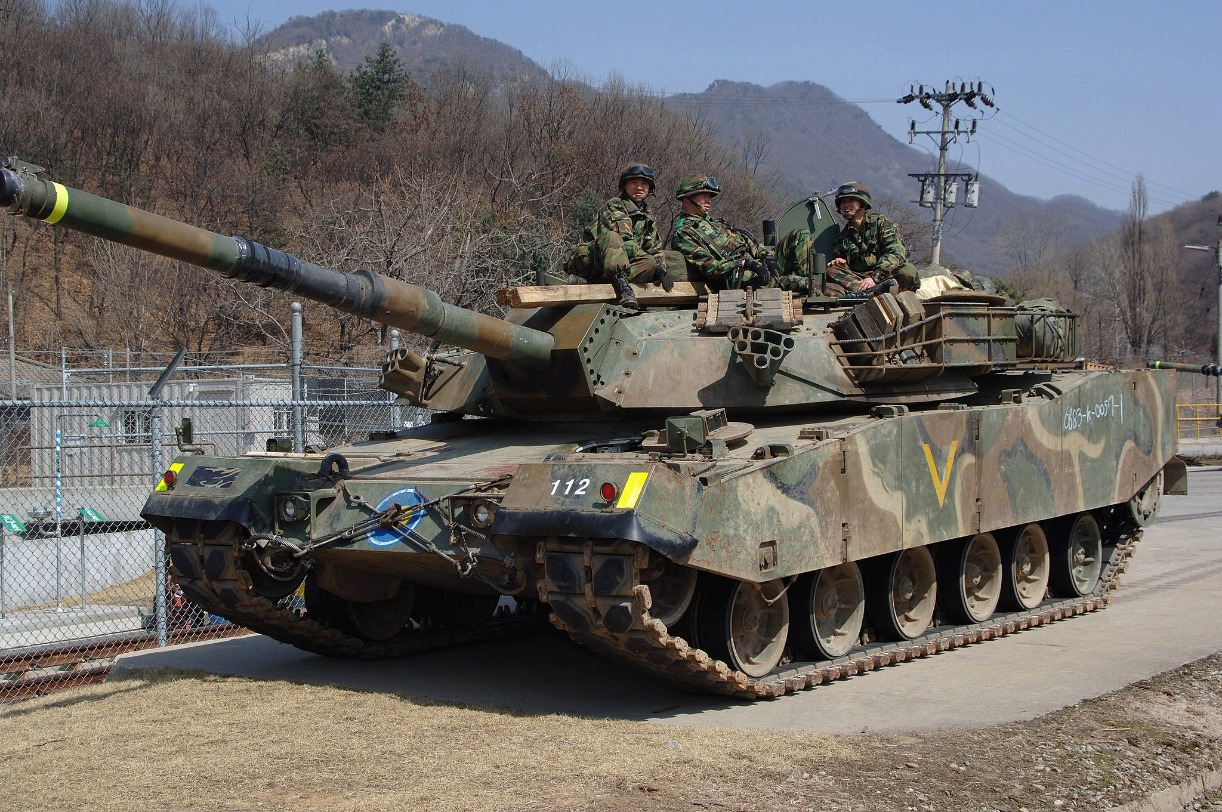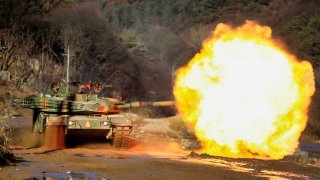South Korea's K1A2 Main Battle Tank Has M1 Abrams 'Military DNA'
The K1A2, armed with a 120mm smoothbore gun, is now more interoperable with South Korea's K2 Black Panther and K21 infantry fighting vehicle.
Summary and Key Points: South Korea has bolstered its armored forces with the delivery of the latest batch of upgraded K1A2 main battle tanks (MBTs).

-Produced by Hyundai Rotem, the K1A2 is an enhanced version of the K1A1, incorporating upgrades like rear surveillance cameras, a battlefield management system, and new digital systems.
-These improvements enhance real-time operational response and battlefield visualization.
-The K1A2, armed with a 120mm smoothbore gun, is now more interoperable with South Korea's K2 Black Panther and K21 infantry fighting vehicle.
-Despite the advanced K2 being among the world's best MBTs, the K1A2 remains a crucial asset for South Korea's defense.
Fourth Batch of K1A2 MBTs Has Been Delivered
The South Korean military's armored force has been further bolstered with the delivery of the latest batch of the domestically-built K1A2 main battle tanks (MBTs), significantly increasing the capabilities of the armored vehicles.
According to a report from international military intelligence analyst firm Janes, the South Korean Hyundai Rotem transferred the upgraded version of the K1A1 to the Republic of Korea (RoK) Armed Forces "earlier this month," while "it also confirmed that the RoK Marine Corps has inducted batch-four K1A2s."
The K1 was the first MBT to be domestically produced in South Korea, based on the technology from the American XM1 program that led to the development of the M1 Abrams.
Batch Four is Complete
The exact number of K1 tanks in the latest batch to receive the upgrades was not disclosed, but the RoK's forces had around thirty-five K1A1 tanks in service that were to be updated to the A2 platform.
In a statement, the South Korean Defense Acquisition Program Administration (DAPA) explained, "The K1A2 tank was sequentially deployed to the RoK Army and RoK Marine Corps. The tank is expected to increase combat efficiency, operator convenience, and safety through improved performance. Equipped with rear surveillance cameras, the real-time operational response capability of the tank has been strengthened."
Janes further cited DAPA, noting that the tanks in this fourth batch to undergo the updates have also received an upgrade to the "battlefield management system and new digital systems that replace the legacy analogue equipment integrated into the K1A1 type," while the improved variant is able to "share real-time information based on digital maps and visualize the battlefield situation."
The K1 entered service in the late 1980s, and much like the American M1, it has been steadily improved with more advanced systems that have enhanced its capabilities. The K1A2 entered service in 2013. While more than 1,000 K1 tanks were produced, as of 2022 South Korea operated around 480 that had been upgraded to the K1A2 standard. It is unclear when the remainder could – or even will – receive a similar upgrade.
The Workhorse MBTs
The K1A2 is armed with a 120mm, KM256 Smoothbore (L44) along with a coaxial 7.62mm machine, and a 7.62mm MG and .50-caliber MG on the top of the turret. It has a maximum rate of fire of ten rounds per minute and can shoot the Korean Smart Top-Attack Munitiona top-attack fire-and-forget projectile that is fitted with its own guidance system.
The new upgrades enable the K1A2 MBTs to have "improved interoperability" with the Hyundai Rotem-produced K2 Black Panther as well as the Hanwha K21 infantry fighting vehicle. While those vehicles are considered to be the backbone of the RoK Armed Forces, the K1A2 remains the workhorse.
Seoul operates just over 200 of the K2s, considered to be among the best MBTs in service in the world today, but given the threat from its neighbor to the north, the South Korean military knows it could need every tank at its disposal.
Author Experience and Expertise: Peter Suciu
Peter Suciu is a Michigan-based writer. He has contributed to more than four dozen magazines, newspapers, and websites with over 3,200 published pieces over a twenty-year career in journalism. He regularly writes about military hardware, firearms history, cybersecurity, politics, and international affairs. Peter is also a Contributing Writer for Forbes and Clearance Jobs. You can follow him on Twitter: @PeterSuciu. You can email the author: [email protected].
Image Credit: Creative Commons and/or Shutterstock.


